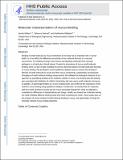| dc.contributor.author | Witten, Jacob Julian Seid | |
| dc.contributor.author | Samad, Tahoura Sajida | |
| dc.contributor.author | Ribbeck, Katharina | |
| dc.date.accessioned | 2021-12-06T23:13:16Z | |
| dc.date.available | 2021-10-27T19:53:42Z | |
| dc.date.available | 2021-12-06T23:13:16Z | |
| dc.date.issued | 2019 | |
| dc.identifier.issn | 1526-4602 | |
| dc.identifier.uri | https://hdl.handle.net/1721.1/133591.2 | |
| dc.description.abstract | © 2019 American Chemical Society. Binding of small molecules to mucus membranes in the body has an important role in human health, as it can affect the diffusivity and activity of any molecule that acts in a mucosal environment. The binding of drugs and of toxins and signaling molecules from mucosal pathogens is of particular clinical interest. Despite the importance of mucus-small molecule binding, there is a lack of data revealing the precise chemical features of small molecules that lead to mucus binding. We developed a novel equilibrium dialysis assay to measure the binding of libraries of small molecules to mucin and other mucus components, substantially increasing the throughput of small molecule binding measurements. We validated the biological relevance of our approach by quantifying binding of the antibiotic colistin to mucin, and showing that this binding was associated with inhibition of colistin's bioactivity. We next used a small molecule microarray to identify 2,4-diaminopyrimidine as a mucin binding motif and confirmed the importance of this motif for mucin binding using equilibrium dialysis. Furthermore, we showed that, for molecules with this motif, binding to mucins and the mucus-associated biopolymers DNA and alginate is modulated by differences in hydrophobicity and charge. Finally, we showed that molecules lacking the motif exhibited different binding trends from those containing the motif. These results open up the prospect of routine testing of small molecule binding to mucus and optimization of drugs for clinically relevant mucus binding properties. | en_US |
| dc.description.sponsorship | NIH (R01-EB017755) | en_US |
| dc.description.sponsorship | NSF (Career PHY-1454673) | en_US |
| dc.description.sponsorship | MRSEC Program - NSF (Award DMR-14-19807) | en_US |
| dc.description.sponsorship | NSF Graduate Research Fellowship (Grant No. 1122374) | en_US |
| dc.description.sponsorship | NIH Pre-Doctoral Training Grant (T32GM87232) | en_US |
| dc.description.sponsorship | PepsiCo Agmt (4101535548) | en_US |
| dc.description.sponsorship | Novartis Agmt dtd 3/1/2018 | en_US |
| dc.language.iso | en | |
| dc.publisher | American Chemical Society (ACS) | en_US |
| dc.relation.isversionof | https://dx.doi.org/10.1021/ACS.BIOMAC.8B01467 | en_US |
| dc.rights | Creative Commons Attribution-Noncommercial-Share Alike | en_US |
| dc.rights.uri | http://creativecommons.org/licenses/by-nc-sa/4.0/ | en_US |
| dc.source | PMC | en_US |
| dc.title | Molecular characterization of mucus binding | en_US |
| dc.type | Article | en_US |
| dc.contributor.department | Massachusetts Institute of Technology. Department of Biological Engineering | |
| dc.contributor.department | Massachusetts Institute of Technology. Computational and Systems Biology Program | |
| dc.relation.journal | Biomacromolecules | en_US |
| dc.eprint.version | Author's final manuscript | en_US |
| dc.type.uri | http://purl.org/eprint/type/JournalArticle | en_US |
| eprint.status | http://purl.org/eprint/status/PeerReviewed | en_US |
| dc.date.updated | 2021-09-10T13:42:33Z | |
| dspace.orderedauthors | Witten, J; Samad, T; Ribbeck, K | en_US |
| dspace.date.submission | 2021-09-10T13:42:34Z | |
| mit.journal.volume | 20 | en_US |
| mit.journal.issue | 4 | en_US |
| mit.license | OPEN_ACCESS_POLICY | |
| mit.metadata.status | Publication Information Needed | en_US |
